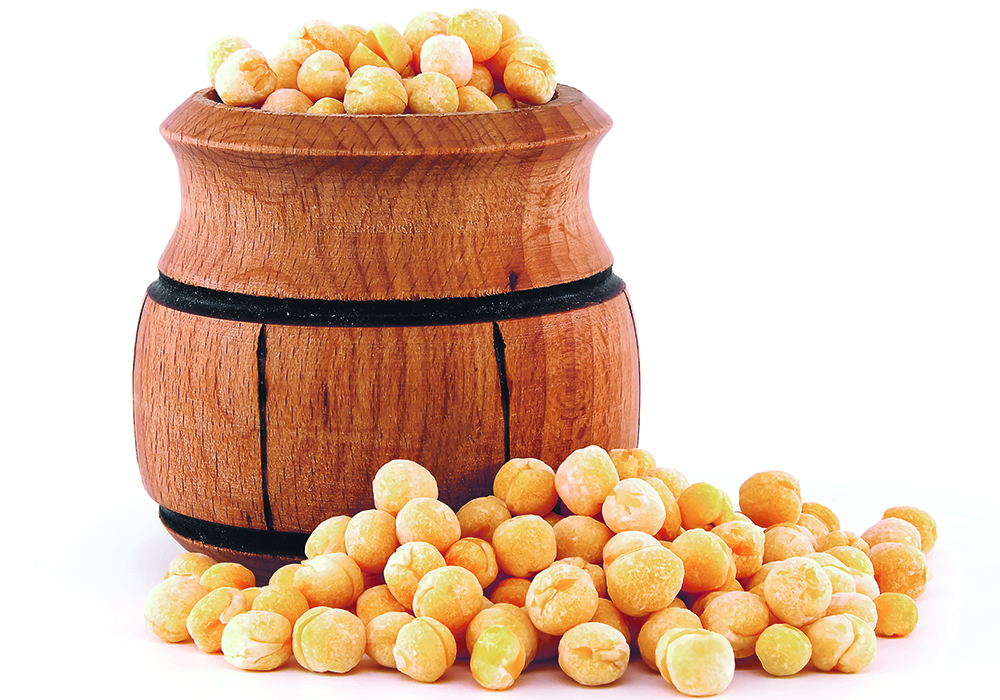A partnership between AGT Food and Ingredients in Regina and Israel-based Equinom could spell new markets for yellow pea protein grown on the Prairies.
AGT chief executive officer Murad Al-Katib said the company will commercialize functional ingredients from Equinom’s ultra-high protein yellow pea varieties.
Equinom uses proprietary technology called Manna to develop the non-GMO varieties. Artificial intelligence analyzes thousands of seeds to identify the best breeding combinations and produce desired ingredients.
The goal is improved taste, texture and performance in food manufacturing
Read Also

Saskatchewan dairy farm breeds international champion
A Saskatchewan bred cow made history at the 2025 World Dairy Expo in Madison, Wisconsin, when she was named grand champion in the five-year-old Holstein class.
Al-Katib said variety trials over three years in Saskatchewan, Alberta, Manitoba, North Dakota and Montana have performed well in yield and against disease. Protein levels are markedly higher than traditional varieties, he said.
Equinom varieties contain about 70 percent protein.
Al-Katib said protein concentrates rise during fractionation and starting with a higher level should mean more sustainable processing methods.
“Isolate manufacturers are using a very intensive process to get to 80 or 85 percent concentrations,” said Al-Katib. “Our whole thesis is if we can work with breeders and seed companies and with our growers, who are early adopters of technology, then you ultimately can develop a feedstock of yellow peas that are very high in protein that allow you to get to much higher protein concentrations with much less inputs.”
Being able to save water and energy in processing is key. Manufacturers and consumers want higher concentrations with lower inputs, he said.
A protein extraction plant that wet mills can consume as much water as a 20,000-person city neighbourhood.
“We’re using a dry fractionation method,” he said, to separate products based on densities.
“The Equinom partnership will allow us to develop some natural, clean label, high protein concentrates that we think are going to be very unique for the food industry.”
Some seed is available and full contracted production is expected in 2024.
Commercialization will take place at AGT’s new extrusion plant in Regina, which is currently in the commissioning phase.
“We’re going to be producing texturized proteins, extruded flours and really high value ingredients for the food industry,” said Al-Katib.
As the largest value-added pulse company and largest pulse ingredient producer in the world, he added, it made sense to work with Equinom to scale up the new varieties.
But he noted the proof will be in the pudding.
“We’ve got to still grow thousands and thousands of acres, and farmers have to be happy with their yields, and we have to be happy with the quality and we ultimately think, though, that there’s enough here that it was definitely worth the long-term partnership,” he said.
Yellow peas account for the largest acreage of pulses and high-protein varieties could boost domestic milling.
The yellow pea market has been volatile. Canada’s main market was India and now it’s China, which makes it reliant on government policy.
However, Al-Katib said it is the most cost-effective pulse in terms of starting price and yields.
“Yellow peas is a very competitive crop for the grower and it’s a very competitive starting point for the ingredients companies” who are making the food product, Al-Katib added.
“Bottom line is, it’s got to taste good and it’s got to be affordable.”
The new extrusion plant is located in AGT’s building in Regina’s northeast industrial area.
















